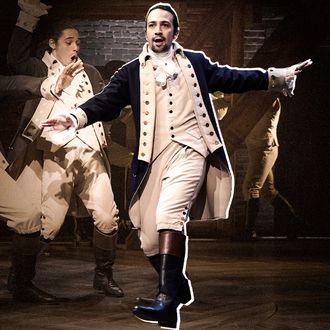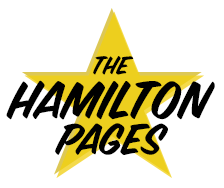
When Hamilton opened Off Broadway at the Public Theater last February, and then transferred to Broadway in August, many of the reviews, including mine, used words like historic, groundbreaking, and unprecedented to describe Lin-Manuel Miranda’s achievement. There’s plenty to debate in those descriptions; what, after all, was so new? Hip-hop had been appropriated by musicals before, not least in Miranda’s own previous Broadway outing, In the Heights. American history was not virgin territory for musicals either: 1776 covers some of the same period and, in Thomas Jefferson, even shares a character. Nor, thankfully, was Hamilton’s almost entirely nonwhite casting a novelty, though it is certainly employed to greater textual effect than in, say, the all-black Hello, Dolly! of 1967. That production taught us that Pearl Bailey could play an Irishwoman for the purposes of sentimental comedy; Hamilton demonstrates that any all-white history of our country is missing half its heart.
Still, it’s at least arguable that, as a show, Hamilton is less a breakthrough than a culmination: one of those works in which lots of ideas and trends in musical theater and culture get synthesized and reprocessed. Whether it points in a new direction or remains a marvelous unicorn is unknowable at the moment, and will remain so for quite a while. Surely copycats will pillage its toolbox; can a Fifth Harmony history of the DAR be far behind? But whether Hamilton will become another Oklahoma! or Company, changing the expectations for all musicals going forward, as those two did in 1943 and 1970, will depend on whether its techniques and attitudes can be applied to a wide range of stories, and on whether artists skilled enough at handling the raw ingredients arise to follow in Miranda’s footsteps. Personally, I’m doubtful of both.
That’s because the thing that is inarguably rare about Hamilton is Miranda himself. As a theater artist who successfully writes both music and lyrics, he is already part of a rarefied club; Stephen Sondheim, Frank Loesser, Cole Porter, and, among youngish contemporaries, Adam Guettel, Michael John LaChiusa, and Jason Robert Brown come to mind as others. Add book-writer to the job description, and half of those names drop away; only Loesser, LaChiusa, and Brown remain as compleat authors of at least one musical each. An apter triple-threat comparison might be Jonathan Larson, of Rent, a Hamilton-size hit in 1996 that nevertheless failed to achieve its expected “game-changer” status, in part because Larson died, at 35, on the morning of its first Off Broadway preview. In any case, neither Larson nor any of the others also starred, as the 35-year-old Miranda does, in his own work: a grand slam that in the modern history of musical theater is nearly unprecedented. I can think of only two major figures with as many fingers in their respective pies: Noël Coward and George M. Cohan.
Actually, both of those men sometimes directed their own work as well; Miranda has generally collaborated, quite closely, with the director Thomas Kail. Still, the key thing is that in Hamilton, as in In the Heights, he has not only written the whole show but written much of it for himself. It doesn’t matter that other performers have played and will continue to play the leading roles Miranda originated; some may even be better at it. (Miranda’s voice is often a bit ragged, and his style sometimes overingratiating.) What matters is that in Miranda, the literary-musical drive, as expressed in abstract notions of structure and craft, is atypically joined to a performative drive, as expressed in concrete notions like playability and charm. Even if only unconsciously he must always be asking not only “Will this work?” but “Will I get my laugh?”
Without proper balance, that bipolar perspective could get really annoying; indeed, the smugness and voraciousness of some of Coward’s and Cohan’s preserved performances can leave you wanting to run for the fire exit even as they compel attention. Miranda has his ego under better control. He can play other qualities than his own; while In the Heights has autobiographical elements, Hamilton, except in the broadest possible terms, clearly doesn’t. Helping to keep him in check is his respect for and attention to form: not only the forms of history but of songwriting. His rhymes may be more Jay Z than Oscar H., but he rarely missteps in applying the logic of the best lyricists to storytelling. (Words that correlate sonically have to correlate in meaning — and be important.) It helps that he’s a songwriting magpie, having grown up in a family and community where so many sounds were intersecting: the hip-hop of Big Pun and the Beastie Boys, the salsa of Rubén Blades and Marc Anthony, the mambo of Celia Cruz, the golden-age triple crème of West Side Story and Fiddler. (He performed in both in high school.) Sondheim in particular became an idol and then a mentor.
Lots of people idolize Sondheim and shiver with pleasure at his internal rhymes, but the more important thing Miranda appears to have learned from the master is the importance of taking his time to get things right. Both In the Heights and Hamilton were very long aborning, even by Broadway standards, and despite the huge éclat that greeted the Public Theater production, Miranda insisted on pausing to improve the show before moving to Broadway, when many advised an immediate transfer. That he would be, as the show’s star, the one who had to live most intimately with all his good and bad choices no doubt helped motivate him; that he wasn’t just one author out of three but one out of one no doubt gave him the clout. Aside from everything else, that’s why Hamilton seems so unlikely to be the groundbreaker so many of us called it at first, why it seems so unlikely to usher in a new age or build a new wing in the hall of musical theater. Its success has depended too much on the nearly unique combination of influences, talents, and tastes of one man, and on his will to deliver the results himself. What are the chances of another such person coming along anytime soon?


